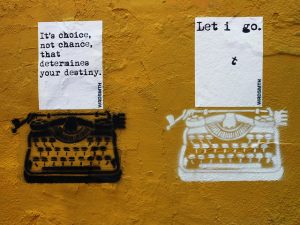Posts by Lisa Cron
photo by Ryan McGuire via Flickr
It’s even hard to type that word, especially when thinking of oneself. Success. What is it, exactly? Specifically? What would it be like for you, in your life?
One of the things that I often suggest to writers when thinking about what their protagonist enters the story already wanting is something I call the “Eyes Wide Shut” test. Meaning: can you close your eyes and see, specifically, what would actually, really, literally have to happen for them to attain their goal? That is: achieve success. And, going even deeper, can you see (read: feel) what it would then mean to them?
And I don’t mean “feel” as in: they’d be happy, sad, bewildered, or that their heart would pound, tears would pool, or stomach butterflies flutter. But “feel” as in: what would they be thinking? What would they realize? What new insight would they have? And most potent: How is this moment different than what they expected it to feel like back when it was still a far off, much hoped-for goal?
Because there is almost always a massive difference between what we expect something will be like, feel like, and mean to us, and what it actually is like once we get there.
When it comes to success, the one area we don’t tend to focus on is this: the collateral damage. Not damage in the “you broke it” sense, but damage in the “now your life is going to change” sense. As Anatole France so poetically opined, “All changes, even the most longed for, have their melancholy, for what we leave behind us is a part of ourselves; we must die to one life before we can enter into another.”
Okay, that is a tad dramatic, but still. It gets the point across. And the thing about success is that it’s so easy to imagine it as a “destination,” when it actually forces us to keep moving, to up our game, do more, try harder. Because having achieved success means that now there is another mountain to scale, and the pressure is even greater. It’s an ongoing process that never, ever lets up.
Who knew? Not me.
I thought success was that moment when what you’ve worked hard for comes to fruition, and now you have time to kick back, to relax into it, and then, at long last, things become easier. I know, what a dope.
Which brings me to something that it is hard to say, on so many levels.
First, it’s hard to admit that one has had success. It feels brazen. Braggy. Like you’re Robert Goulet singing “C’est Moi” from Camelot (give it a listen, it’s hilarious).
But okay, here goes. I have had some success doing what I most love: talking story, helping writers zero in on the content of the story they want to tell, and busting the myths that keep them from it. I never thought I could have a book published. Now, I have two. I am asked to speak all over the place. It honestly astounds me – because not long ago I saw myself as nothing more than the schlubby woman in line at Trader Joe’s trying to […]
Read MoreThere is a lot of fear in the world these days. More lately. Much more. Story can help.
Stories ask us to slow down and take stock. Twitter, screaming headlines and clickbait encourage us to do the opposite. And sheesh, that’s a strategy that plays into Mother Nature — our biology. We don’t respond to bumper stickers and soundbites because we’ve been dumbed down; we respond to them because we evolved to live in a much simpler world than the one we find ourselves trying to navigate. In other words, for eons we honed the ability to respond to “Lion, RUN!” the better to avoid becoming lunch. Because back then what you saw really was what you got. The point is: it’s damn hard to undo all that fine-tuned (and previously life saving) wiring.
So how do we uncouple our urge to react to the first thing we hear? By taking a deep breath and searching for the real story. Story is our superpower. By digging beneath the surface action, the statement, the apparent “truth,” story often unearths something very different.
Story questions everything. The surface explanation. Authority. The “official” response. Decorum. Euphemisms. The cover up.
It’s the job of story to rip that cover off, and expose what’s really happening, why and what it means — and that is almost always different from what it looks like from the surface.
Let me give you two examples.
Read Morephoto by Will Montague via flickr
There is a reassuring piece of advice that I find myself giving writers over and over these days, in the hope of sparing them not only a ton of rewriting, but saving them from that nagging voice that keeps suggesting they take up needlepoint and have done with this crazy writing thing once and for all.
It’s this: When you’re stumped about what might happen next, or where the “drama” will come from, or what your protagonist will do, you don’t have to look further than your story’s own backyard. But unlike Dorothy (why does everything always seem to come back to The Wizard of Oz?) just looking won’t do the trick. For writers, you have to dig in it. The good news is this: there is always buried treasure there beneath the surface. Always.
This advice seems relatively straightforward and easy, but it turns out to be hard to implement because there’s a big fat writing myth that gets in the way.
The myth is this: when stumped, the answer to “what should happen next?” is found by turning to the outside world, as if there’s a generic grab bag of Dramatic Possibilities that you can reach into and, voila! problem solved! And so suddenly, out of the blue, it turns out that your protagonist may have murdered her ex-husband (geez, I didn’t even know he was dead); or is now battling a supernatural force that is out to either a) kidnap her child or b) sap her life force for unspecified nefarious purposes; or suddenly she has a lifelong debilitating disease.
The trouble was – in each of those four real cases — that the Dramatic Possibility had absolutely nothing to do with the story the writer was telling. This was a glitch that, once pointed out, the writers in question instantly recognized for what it was: a darling quickly in need of dispatch, rather than what they’d thought it was: a way to amp things up, to make things happen, to be dramatic and so – they hoped – hook the reader.
The irony was that instead of pulling the reader in,
Read MoreThere is no excerpt because this is a protected post.
Read Morephoto by Xygp via Flickr
This column is 11 days late. It should have gone up almost two weeks ago, on my normal date: the second Thursday of the month. But by that Tuesday, although I’d spent days on it and written thousands of words, nothing worked. I went in circles, I dove down rabbit holes, everything I wrote was confusing. I know because my brilliant coach Jennie Nash not only told me so, but pointed out why. And she was always right.
Panicked, I reached out to Therese, who gave me a reprieve, kindly arranging for someone to switch days with me, allowing me more time to write.
I’ve spent the past week writing failed draft after failed draft. Right now it’s Friday afternoon, and I’ve still got nothing.
Because – and it’s painful to admit this — I’ve been writing a column that would’ve been a lie.
And, apparently, I can’t do that – not, however, for lack of trying. I feel like a character in a story – fearful of owning what I honestly believe, feeling incredibly vulnerable. On the surface I want to seem calm, implacable, together. Inside, I’ve been a raging mess.
Read MoreImagery by Guy Billout; photo by Lisa Cron
I used to have this recurring image in my head. I was outside, on a deserted cobblestone street, in a very dim light, hemmed in by thick fog. I couldn’t see anything except gray. There was a strong current in the air – like a riptide. It was scary. I’d wrapped my arms around a thick concrete post, my feet having already lost touch with the ground. I knew with absolute certainty that if I let go, I’d be swept away. Not into darkness, but into . . . the unknown, and what the hell would I do then?
Holding onto that post made me feel safe. Then one day I saw a drawing by Guy Billout in Atlantic Monthly. It was of a cobblestone courtyard surrounded by brick and stone buildings. Fortress like. Impenetrable. Safe.
Except for a lithe green snake that rose and fell through the cobblestones as if they weren’t even there.
The caption was, “There is no safe place.”
For a moment I couldn’t breathe, because I knew it was true. And if there is no safe place, what was I doing standing still? And what, exactly, was standing still keeping me safe from, anyway?
That drawing liberated me. If it’s all a risk, if it’s all a challenge, why not embrace that, instead of a stupid post? I let go. And the amazing thing is that although it was really scary to let go — I’ve stumbled all over the place, and made a major fool of myself more times than I can count — it was scary in a good way.
Change is scary. All change. Even good change. Because it means leaving something familiar behind, and that’s hard, even when that familiar thing isn’t working for us at all. It’s why we stick with the devil we know. It’s not that we’re masochists (I hope), it’s just that we know the drill, and that makes us feel safe — even when we aren’t, even when that familiar drill is the very thing that’s keeping us from getting what we really want. The irony is that our “comfort zone” is often anything but comfortable.
My motto became: if it’s not at least a little bit scary, it’s not worth doing. I’m sharing that thought with you now for three reasons:
Read Morephoto by Meena Kadri via Flickr
Here’s a scary thought. When it comes to writing, you may have done everything you’ve been taught to do with utter perfection, and precisely because of that, it turns out you’ve written something that is flat, boring and uninvolving. This all too common phenomenon is something I’m going to be deconstructing, myth by myth, for the next several months in my columns here. I’m beginning this month with the overarching granddaddy of them all – the myth that derails otherwise riveting stories before they’re even created.
It’s this: The myth that beautiful writing is what makes you a real writer, and (an even more damaging belief) that the beautiful writing comes first, before everything else. Beautiful writing is often equated with talent, and without talent, why write at all?
It is heartbreaking how many writers suffer from the deep rooted, often crippling fear of not “writing beautifully” from the very first iteration of the very first sentence on the very first page of the novel. We’ve been trained to be so fearful of penning anything that feels like “ugly writing” that we often end up creating something far worse.
Read Morephoto by Tobias Leeger via Flickr
Pop quiz: Where do your characters go when they aren’t in the scene you’re writing? Are they pacing in the greenroom? Maybe chowing down at the snack table, catching a quick nap, or binge watching old episodes of Murder She Wrote on Netflix while waiting for their next cue. Or – and this is the most likely – have you inadvertently pressed the pause button, and sent them into stasis? As in, out of sight, out of mind.
After all you have so much on your mind – you’re focused first and foremost on the scene you’re writing. In fact, you may be so focused on what your protagonist is doing, that even the secondary characters right there on the page have blurred a bit. They’re no longer specific people, but representatives of a general category: mom, dad, BFF, sibling, co-worker. Uh oh.
A gifted writer I work with had that habit. Whenever her protagonist, Tess, appeared in a scene with her parents, Tess remained vivid and driven, but her parents turned bland and generic. When asked what was going on, the writer said, “Well, that’s how most parents I know act during a family dinner – so it’s totally believable.” But it wasn’t believable at all, because it wasn’t what Tess’s parents would have done; in fact, it wasn’t what anyone who had a specific past would have done — and sheesh, we all have a specific past, every last one of us. Ditto each and every character we create.
So in order to figure what actually would have happened at that family dinner, the writer had to plumb Tess’s parents’ story-specific pasts in order to unearth what, exactly, they would have done, and far more importantly, why they might have done it. This didn’t simply apply to that one scene in question, but to everything they did throughout the novel. Which, in turn, changed a bit of what Tess herself did, because now the writer had a much better handle on the situation Tess was dealing with, who she was, and how she saw the world.
The work the writer did to give her characters well-developed, story-specific agendas was invaluable, because now she had reliable, sturdy guidelines, enabling her to both create and track the arc of all their storylines – scene by scene — throughout the novel.
Which brings us right back to the question we started with: Where do these well-developed, story-specific characters go, and how do they keep themselves busy, when they’re not in the current scene?
The answer is amazingly simple:
Read Morephoto by Doran via Flickr
There’s a meme I always see out there on Facebook (and that’s the whole world, right?) that makes me crazy. It’s the often lotus-adorned command to “let it go.” Something’s happened to you, something’s bothering you, and you’re told to just let it go. As if the fact that it’s bothering you is somehow your fault, and you’re purposefully holding onto it, as if it’s a choice. And, even more insidious, as if by “letting it go” –poof! It’s gone, and so is the pain, desire, and regret.
This is something I can’t let go because it’s so deeply wrong. Not only isn’t “letting go” possible in the way it’s so often taken to mean, but it shames us in the process. Now we have two problems: that thing we “can’t let go of” and the fact that we’re somehow morally weak because we’re “letting it” bother us. Yikes!
The reason this is on my mind today is that Jennie Nash and I have just finished teaching the beta version of our online workshop based on my upcoming book, Story Genius. It was thrilling to see so many writers – both fledgling and seasoned — crack open their stories and write with such power. A few writers, however, struggled much harder than others, and when we stepped back to try to figure out why, we noticed that the biggest thing that held them back had nothing to do with their ability to write. What held them back most was what they’d already written.
We’ve all heard the adage that we should kill our darlings and we all think, “Yes, right, of course!” But what we’re envisioning is a finely wrought sentence here or there, a couple of pages that don’t work, maybe a scene. It’s hard to kill these little darlings, because they’re not only part of what we’ve written, they’re part of us. We made them, we love them. Tough as it is, however, writers do often muster the courage to hit the delete button and move on. In these cases, we know what’s good for our story. We know what must be done, and so we let it go.
But no writer ever in the history of the world thought that the darling this adage refers to might be
Read MoreI’m continuing to write about backstory because it continues to be a topic that confounds writers — and not just any old topic, but a seminal topic. Because backstory is the heart of your novel, without it you will just have a bunch of surface things that happen. In fact, you not only need to create your protagonist’s story-specific backstory before you shove her onto page one, that very backstory will be on the first page. I’m betting you don’t believe me, which is why this month’s entry is all about how backstory is very often right there in the first few pages of your novel, and how it often goes on for pages.
And here’s the shocking thing, given the way writers are often told to think of backstory (that it slows the novel down; or worse, stops it altogether): backstory is actually what holds the story together. It’s the spark that gives it juice. It’s what pulls you in and makes you care. It’s the layer we’re hardwired to respond to; it’s what gives meaning to everything that is happening up there on the surface.
Wait, you might be thinking. Am I hearing you correctly? Because it sure as heck sounds like you’re talking about an Info Dump. We touched on this a couple of months ago, but right now I want to shine a bright light on it. This might make you feel kind of squeamish. I mean, an “Info Dump” sounds like something you scrape off the bottom of your shoe. Definitely not like something you talk about in polite society.
Ah, but we must. Because the problem is that we’ve conflated Info Dumps with what is being “dumped.” That is: backstory. Writers are taught to shun backstory for fear it will “slow their story down” or worse, derail it entirely. And hey, since the last thing you want is to inadvertently leave “droppings” of backstory throughout your novel, why even spend much time developing it? Arrghh! That’s like putting on an ill-fitting, poorly constructed pair of pants, looking in the mirror and thinking, “Boy that looks awful, I’m NEVER wearing pants again!” It’s not pants that are the problem; it’s the way THOSE pants were made (and if you’re anything like me, spending a bit more time at the gym wouldn’t hurt either).
The point is, when it comes to Info Dumps, backstory is not the problem. It’s how the backstory is injected into the narrative that matters. When it’s unceremoniously dumped, it does stop the story cold. And yes, absolutely, no one should do that. Ever. But when backstory is artfully layered in? It’s what makes the story compelling, propelling it forward, giving it power. The takeaway on backstory is this: don’t give us backstory inartfully.
So, let’s focus on two things here:
photo by Matthias Weinberger via flickr
No one likes a drama queen. We all have ‘em in our lives — that person who’s forever casting tiny things as great big problems, and getting everyone riled up over what turns out to be a bucket of nothing. They can be fun to watch for a bit, but they’re ultimately exhausting. It doesn’t take long to realize that those “great big problems” of theirs have no real consequence, which means that they aren’t problems at all.
Real drama is something else altogether. And – here’s the surprising thing – real drama very often has little to do with big, externally dramatic events – real or imagined. Real drama is internal, and that is the kind of drama that stories are about.
Think of real drama as the internal struggle that the plot catapults your protagonist into, forcing her to take action whether she wants to or not. If taking that action doesn’t cost your protagonist dearly on a deep emotional level, then it’s not a problem. Nor is it a story. Even if, on the surface, something big happens.
For instance, your protagonist might expect a completely normal day, and instead meets the love of her life at the bus stop, forever changing the course of her life in every way. Sounds huge, doesn’t it? But unless it mucks up something just as important to her, or unless there’s something she now has to overcome in order commit to her new found beloved, who cares? There’s a reason why stories never begin with “and they lived happily ever after.” Without internal conflict – without something crucial at stake — we not only can’t learn anything from her, we’re not really interested.
It’s a simple equation:
Read Morephoto by Tim Sheerman-Chase via Flickr
We spend so much time delving into our writing, working at it, thinking about it, that it’s easy to lose sight of why we’re doing it. I’m not talking about our own personal reason for it (which would no doubt be a revealing exploration in itself), but about the effect what we write has on our readers once it leaves our laptop and ventures into the world on its own. Because at the end of the day, that’s why we’re writing: to affect the lives of those who read our work.
And it turns out we have way more power to do that than we know.
It’s just that focusing on that power may feel, you know, a tad egotistical — I shall change how my readers see the world! Plus since writing is hard, we tend to spend much more time sweating over why on earth our protagonist would want to juggle chainsaws for a living, than on how the answer will change our reader’s worldview.
But it will change it. That’s the evolutionary purpose of story: to allow us to vicariously experience difficult changes without risking life and limb (or, um, heart), so that should the situation arise when life and limb are in jeopardy, we’ll know what to do. And, just as important, why we need to do it.
But that’s something only noble stories teach us, right? Literary novels, high-minded films, that sort of thing. Certainly not action movies like Delta Force, or frivolous comedies like Ghostbusters, or romantic fluff like Dirty Dancing. Those things are just “mindless entertainment” and so easy to dismiss as nothing but time wasters, thus of little consequence. It’s not like that kind of “drivel” could ever help a nation, say, topple a dictator. Could it?
In the 1980s one country’s secret police didn’t think so. And they were wrong.
Read Morephoto by R/DV/RS via Flickr
Let’s talk about backstory. Last month in my post I wrote a lot about it, and when reading through the always insightful comments, it struck me that there is a bit of legitimate confusion, along with some deeply ingrained misconceptions, about backstory: what it is, its role when creating a novel, and its place within the novel itself. So I thought it was high time to redefine the term.
The above paragraph? That is backstory.
Backstory is the fundamental “why” that drives what a person does, what they say – and, even more revealing, backstory defines what they actually mean when they say it.
I’m not just talking about writers and writing. I’m talking about life. We humans make every decision based on our own subjective backstory, aka our past experience. Our brain is wired to instantly rip through our mental Rolodex (remember those?) in order to figure out the one thing we’re all striving for every minute of every day: what to do in order to survive. Every action we ever take is driven by what our backstory assures us is the right thing to do. We never stop acting based on backstory. We can’t. And so our past is continually woven into our present, ever defining it.
But what our personal backstory tells us to do to survive is not always right. I’m betting none of us has to think too hard to remember something that felt soooo right at the time, only to discover that it was anything but. That’s where story comes in. The goal of a story is to challenge a belief that your protagonist’s past has taught her is true, when in fact, it isn’t.
For writers out here in the real world, one of those misbeliefs is what we’ve been taught about backstory.
Read More




















